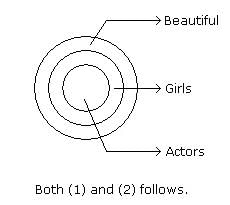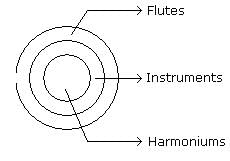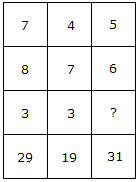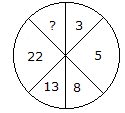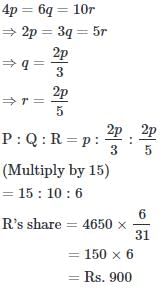EMRS Accountant Mock Test - 3 - EMRS MCQ
30 Questions MCQ Test EMRS Accountant Exam Mock Test Series 2025 - EMRS Accountant Mock Test - 3
In the following question assuming the given statements to be true, find which of the conclusion among given conclusions is/are definitely true and give your answers accordingly.
Statements:
B > C; C < D; D > E; E > F
Conclusions:
I. C < F
II. B > D
In the following question assuming the given statements to be True, find which of the conclusion among given conclusions is/are definitely true and then give your answers accordingly.
Statement:
P > S ≥ M = L < J = N
Conclusions:
I. L < N
II. P > M
III. S = L
P > S ≥ M = L < J = N
Statements:
All the actors are girls.
All the girls are beautiful.
Conclusions:
1. All the actors are beautiful.
2. Some girls are actors.
All the actors are girls.
All the girls are beautiful.
1. All the actors are beautiful.
2. Some girls are actors.
Statements:
All the harmoniums are instruments.
All the instruments are flutes.
Conclusions:
(1) All the flutes are instruments.
(2) All the harmoniums are flutes.
P is 15m to the west of Q. R is 13m to the south of Q and 5m to the east of S. T is 20m to the north of S.T is 10m to the east of U…….
Q.
In which direction R with respect to P
N is more intelligent than M. M is not as intelligent as Y. X is more intelligent than Y but not as good as N. Who is the most intelligent of all ?
Q. In a queue, Rahul is fourteenth from the front and John is seventeenth from the end, while Alisha is in between Rahul and John. There are 48 persons in the queue, how many persons are there between Rahul and Alisha?
There are five persons sitting on a bench. The one, who is at extreme left, is heaviest. D is second from right and is the lightest. A is sitting to left of B, who is heavier than him. C is heavier than B but is not the heaviest.
Q. Who is 4th from right?
'Table' is related to 'Wood' in the same way as 'Shirt' is related to:
If REUNION LIMITED is written as QAOMEIM KELESAC, how will SCHOOL be written?
The average of 7 consecutive number is n, if the next 2 number also included then the new average will be increased by ?
The average number of runs scored by Virat Kohli in four innings is 48. In the fifth inning, Kohli scores some runs such that his average now becomes 60. In the 6th innings he scores 12 runs more than his fifth innings and now the average of his last five innings becomes 78. How many runs did he score in his first innings? (He does not remain not out in any of the innings)
If 4 (P's Capital ) = 6 ( Q's Capital ) = 10 ( R's Capital ) , then out of the total profit of Rs 4650 , R will receive
A large tanker can be filled by two pipes A and B in 60 minutes and 40 minutes respectively. How many minutes will it take to fill the tanker from empty state if B is used for half the time and A and B fill it together for the other half?
A leak in the bottom of a tank can empty the full tank in 6 hours. An inlet pipe fills water at the rate of 4 liters a minute. When the tank is full, the inlet is opened and due to the leak, the tank is empty in 24 hours. How many liters does the cistern hold?
By selling a cap for ₹ 29.75, a man gains 6.25%. What will be the CP of the cap?
A steel wire is bent in the shape of a square having semi-perimeter as 18 cm and an area of 81 cm2, and then the same wire is again bent to make a circle. Find the ratio of the area of square to that of circle.
Based on the information in the passage, with which of the following statements would the author most likely disagree?
Implicit in the author‘s argument that leaks result in far more limited and unreliable policy discussions with foreign leaders is the idea that:
Identify the incorrect sentence or sentences
A. It was a tough situation and Manasi was taking pains to make it better.
B. Slowly her efforts gave fruit and things started improving.
C. Everyone complemented her for her good work.
D. She was very happy and thanked everyone.
Directions: Spot the error in the underlined part of the sentence and choose the correct sentence accordingly.
The tendency to eat late, though it has never been tested properly, many nutritionists believe, as a factor in putting on weight.
Direction: The sentences given in the question, when properly sequenced, form a coherent paragraph. Each sentence is labeled with a letter. Choose the most logical order of sentences from the given choices to construct a coherent paragraph.
A. Good writers use more verbs.
B. However, it is hard to write without verbs.
C. The reason is that if unnecessary words are reduced, the verb-percentage goes up as a mathematical necessity.
D. So “use verbs” is not really good advice; writers have to use verbs, and trying to add extra ones would not turn out well.
Direction: The sentences given in the question, when properly sequenced, form a coherent paragraph. Each sentence is labeled with a letter. Choose the most logical order of sentences from the given choices to construct a coherent paragraph.
A.The oldest fossil grasses are just 70 million years old, although grass may have evolved a bit earlier than that.
B. There have been land plants for 465 million years, yet there were no flowers for over two-thirds of that time.
C. The equally-familiar grasses appeared even more recently.
D. Flowering plants only appeared in the middle of the dinosaur era.
Direction: The sentences given in the question, when properly sequenced, form a coherent paragraph. Each sentence is labeled with a letter. Choose the most logical order of sentences from the given choices to construct a coherent paragraph.
A. Patrilineal ownership of lands and the culture of dowry attached to it have turned daughters into bad debts.
B. The control of such castes on local politics aggravates masculine hubris.
C. The bigotry of our village culture and polity is intrinsically linked to a control of land and agriculture.
D. Land makes certain castes ‘kingly’ in rural communities.



